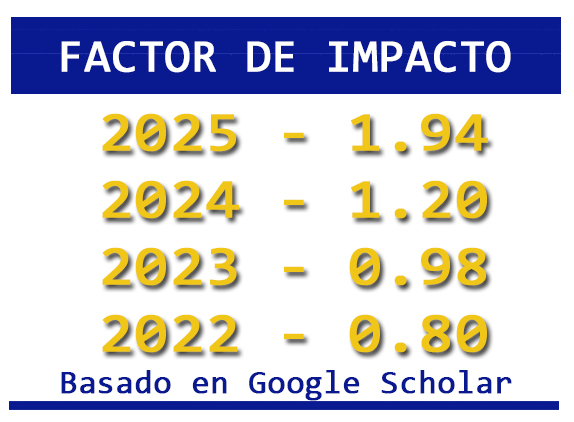SOBRECARGA DEL CUIDADOR PRINCIPAL DEL ADULTO MAYOR CON ENFERMEDAD ALZHEIMER
DOI:
https://doi.org/10.36790/epistemus.v10i21.31Keywords:
Cuidadores, sobrecarga, AlzheimerAbstract
Introducción: La sobrecarga del cuidador principal es un problema recurrente en personas que cuidan de adultos mayores con trastorno de Alzheimer. Objetivo: Determinar el nivel de sobrecarga del cuidador principal del adulto mayor con Enfermedad de Alzheimer. Metodología: Estudio descriptivo, participaron los cuidadores principales de cinco Centros Geriátricos de Querétaro, se aplicó la escala de Zarit (α=.86). En el análisis de datos se calculó estadística descriptiva y se contó con el consentimiento de las instituciones y de los participantes. Resultados: Participaron 22 cuidadores, del nivel de sobrecarga en los participantes se identificó nivel intenso en 77.3% y 4.5% leve. Conclusiones: La mayoría de los participantes se encontró en sobrecarga intenso, resultados que permiten diseñar e implementar estrategias para disminuir la sobrecarga de los cuidadores.
Downloads
References
Secretaria de Salud, Programa de acción específico 2007-2012: Envejecimiento. México: Secretaria de salud, 2008.
M. Ballester, L. Borrás, G. Corbalán, B. Hernandez, G. Paul, J. Pérez, “Perfil de salud y diagnósticos de enfermería en la población de atención domiciliaria del Área Básica de Salud de Castellar del Vallés”, NUREInv., vol 5, no32, pp. 1-18, 2008.
Instituto Nacional de Estadística y Geografía, Censo de población y vivienda 2010. México: INEGI, 2012.
Organización de las Naciones Unidas, Envejecimiento de la población mundial. New York: ONU, 2009.
Y. Yamamoto, Y. Hayashino, T. Higashi, M. Matsui, S. Yamazaki, M. Takegami, Y. Miyachi, S. Fukuhara, “Keeping vulnerable elderly patients free frompressure ulcer is associated with high caregiver burden in informal caregivers”, Journal of evaluation in clinical practice, vol.16, pp. 585-589, 2008.
Organización Mundial de la Salud. (2016) Demencia. Acceso Oct 2016. [en línea]. Disponible: http://www.who.int/mediacentre/factsheets/fs362/es/
Instituto Nacional de Estadística y Geografía, Encuesta Nacional sobre Salud y Envejecimiento en México 2012. México: INEGI, 2012.
M. Pérez, J. Llibrel, “Características sociodemográficas y nivel de sobrecarga de cuidadores de ancianos con enfermedad de Alzheimer”, Revista Cubana de Enfermería, vol. 26, no. 3, pp. 104-116, 2010.
A. Espin, “Factores de riesgo de carga en cuidadores informales de adultos mayores con demencia”, Revista Cubana de Salud Pública, vol. 38, no. 3, pp. 393-402, 2010.
G. E. Flores, R. E. Rivas, P. F. Seguel, “Nivel de sobrecarga en el desempeño del rol del cuidador familiar de adulto mayor con dependencia severa”, Ciencia y enfermería, vol. 18, no. 1, pp. 29-41, 2012. DOI: https://doi.org/10.4067/S0717-95532012000100004
S. Zarit, K. Reever, J. Bach-Peterson, “Relatives of the impaired elderly: correlates of feelings of burden”, Gerentologyst, vol 20, no. 6, pp.649-655, 1980 DOI: https://doi.org/10.1093/geront/20.6.649
A. Martins, T. Pereira, L. Silva, L. Correa, J. Ferreira, R. Partezani, “La sobrecarga y desánimo en los cuidadores de adultos mayors”, Florianapolis, vol. 21, no. 2, pp.304-12, 2012.
E. Pineda, E. Alvarado, F. Canales, Metodología de la investigación. Washington: OPS, 2008.
Secretaria de Salud. (2014) Reglamento de la Ley General de Salud en Materia de Investigación para la Salud. Acceso Abr 2015. [en línea]. Disponible: http://www.diputados.gob.mx/LeyesBiblio/regley/Reg_LGS_MIS_ref01_02abr14.doc
D. Polit, B. Hungler, Investigación científica en ciencias de la salud, México: McGraw-Hil, 1999.
Downloads
Published
How to Cite
Issue
Section
License

This work is licensed under a Creative Commons Attribution-NonCommercial-NoDerivatives 4.0 International License.
The magazine acquires the patrimonial rights of the articles only for diffusion without any purpose of profit, without diminishing the own rights of authorship.
The authors are the legitimate owners of the intellectual property rights of their respective articles, and in such quality, by sending their texts they express their desire to collaborate with the Epistemus Magazine, published biannually by the University of Sonora.
Therefore, freely, voluntarily and free of charge, once accepted the article for publication, they give their rights to the University of Sonora for the University of Sonora to edit, publish, distribute and make available through intranets, Internet or CD said work, without any limitation of form or time, as long as it is non-profit and with the express obligation to respect and mention the credit that corresponds to the authors in any use that is made of it.
It is understood that this authorization is not an assignment or transmission of any of your economic rights in favor of the said institution. The University of Sonora guarantees the right to reproduce the contribution by any means in which you are the author, subject to the credit being granted corresponding to the original publication of the contribution in Epistemus.
Unless otherwise indicated, all the contents of the electronic edition are distributed under a license for use and Creative Commons — Attribution-NonCommercial-ShareAlike 4.0 International — (CC BY-NC-SA 4.0) You can consult here the informative version and the legal text of the license. This circumstance must be expressly stated in this way when necessary.
The names and email addresses entered in this journal will be used exclusively for the purposes established in it and will not be provided to third parties or for their use for other purposes.















